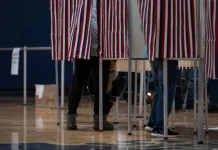According to the latest election polls from Real Clear Politics, Democratic Presidential nominee Hillary Clinton is in the lead, averaging out at 45.0%; Republican Presidential nominee Donald Trump follows at 41.6 %, and Libertarian nominee Gary Johnson and Green Party nominee Jill Stein trail behind at 5.0% and 2.1%, respectively.
There has been speculation throughout the media that this is arguably the most important election in the recent past, and since voting day is November 8th, all parties are actively trying to sway voters and make citizens step up and vote.
“Every election you will find breathless pundits and party hacks saying ‘this is the most important election of our lifetime’ or something similar,” said Wayne Lesperance, Interim Dean of Undergraduate Programs, via email. “The fact is, there’s no way to know that until a President is elected and we see what happens. Still, this is an important election because EVERY election is important.”
Lesperance, who is also a Professor of Political Science and Director of the MA in Public Policy, explained that the importance of this election comes from the importance of the issues being decided: the constitutional protection of abortion and homosexual rights, healthcare and whether or not the Affordable Care Act should continue, among others.
Some of those other issues, according to ProCon.org, which highlights the pros and cons of controversial subjects like the 2016 election, are the war on drugs, racism, gun control, federal taxation, the cost of education, immigration policies, and whether sustainability should be at the forefront of our society.
Regardless of who wins, according to Lesperance, the first step for either presidential candidate is to “figure out how to govern.” Within the first 100 days, U.S. citizens will know what the President’s priorities are; Lesperance believes this is what we can expect:
Hillary Clinton
- Getting a Supreme Court Justice confirmed.
- Focus on ISIS and national security threats.
- Immigration reform.
Donald Trump
- Immigration Reform and building the huuuge wall.
- Reforming the VA.
- Tearing up the Iran Deal–or at least trying.
There is more to this campaign than the current issues, however, according to both James Walsh, Associate Dean of Arts & Humanities, Professor of History, and Director of the MA in American Studies, and Maura MacNeil, Director of the MA in Professional writing and Professor of Creative Writing and Humanities.
Cultural Significance
During a speech in West Bend, Wisconsin, shortly after the riots in Milwaukee, Trump made the claim that “law and order must be restored,” according to NBC News. “It must be restored for the sake of all,” he said, “but most especially for the sake of those living in the affected communities, of which there are many.”
In 1968, the phrase “law and order candidate” was used by both George Wallace and Richard Nixon during their campaigns, according to Walsh. During that time, America’s cities were torn apart by race riots, Martin Luther King Jr. had just been assassinated, and cities were on fire. Walsh believes to use that phrasing today, when our candidates are not facing that type of civil unrest, sheds a false light on the situation America currently finds itself in.
“They have created a mythical picture of the American landscape that sounds like people are running amuck, and yet where is this happening? Other than in situations in which, unfortunately, we’re seeing an eruption of racial tensions in America, again,” explained Walsh.
Whether restoring law and order to America is something that is necessary remains to be seen, but Lesperance feels we have come a long way in the past few hundred years, “since the 19th century with legalized slavery, the era of Jim Crow where African Americans were harassed and murdered for trying to vote and exercise their Constitutional rights, or even since the days of telling two men or women who love each other that the state will not accept their love by recognizing their marriage. We have come a long way. But, there is still a ways to go.”
MacNeil feels similarly: “The issues that have been raised surrounding race, immigration, and gender equality, for example, have captured how we must continue to be vigilant in our work to be inclusive and respect one another.”
“It’s opened up an opportunity to speak to the issues that will define our future,” MacNeil continued.
According to Walsh, one aspect of this future that has been exploited during this election cycle is the use of social media as a part of campaigning and how a “pervasive sense of anti-intellectualism [is] a very strong undercurrent of this election.”
The New York Times recently released a list of all the people Trump has insulted on Twitter, complete with the insults themselves and a color coded timeline–the most recent are highlighted bright yellow, fading the older the insults become. Both Clinton and Trump have used social media to degrade the opposing candidate without offering any evidence to back their claims, but many of Trump’s insults, especially toward Clinton, are one worded and meant to provoke his audience against her. One such example is his use of the word “crooked.”
“The spin that has taken place, information without context, the clear lack of truth, reflects our life in the digital age as we’re bombarded with so much misinformation,” said MacNeil. “Unfortunately, much of that misinformation is used to create fear.”
In addition to exploiting American gullibility through the spreading and accepting misinformation, Walsh claims this election has also uncovered the loss of something very important when it comes to politics: civility. Civility has been replaced by an all-consuming desire to win at all costs.
“Just the fact that wealthy men and corporations can spend unlimited amounts of money telling lies about the candidates they oppose, and it’s called ‘free speech,’ ‘political speech,’ ‘protected by the constitution?’ I think it’s absolutely heinous,” said Walsh. “It’s repulsive, and it’s divisive.”
Voting Third Party
With two polar opposite candidates running for the presidency in the two main political parties, many are claiming that any votes for third parties are “throw-away” votes. According to freepress.org, however, “an unprincipled vote is the only wasted vote,” meaning that voting for someone who is simply “the lesser of two evils” is far worse than voting for someone you believe in.
“If you vote for Gary Johnson or Jill Stein, and you do it because you’ve studied them and you like what they say and what they stand for, then that’s the right thing to do,” said Walsh.
However, after researching them, Walsh claims “neither of them are more qualified to be President than my dog; and I love my dog, but I don’t want him to be President.”
The problem with voting for third party candidates is that our political system does not favor them. In a lot of places, according to Walsh, third party candidates do not even get on the ballot, and are not allowed to debate with the main political parties, which has been noted in all the debates so far this election cycle. Walsh believes Bernie Sanders, who had a “pretty big core of support,” could have run successfully as an independent after he lost the Democratic Nomination, were it not for emphasis on the two party system. The same goes for any third or fourth party candidate.
“We have allowed the Democratic and Republican Parties to take over the electoral process,” said Walsh. “It’s one thing to have parties working for themselves within a framework they can’t fix; it’s another thing for the government to have given them the ability to rig elections. It has become exponentially harder for any views that differ strongly from either of the two parties to get the kind of traction in the electoral process.”
Lesperance, on the other hand, said it is the American people that do not support third party candidates enough to win elections: “There is nothing to prevent third parties from forming and being successful. The American people have voted with their feet by not joining third or fourth parties. At the end of the day, most people find a home in the Democratic or Republican parties.”
While this may be true, it is important to vote for a candidate–whether they be third party or not–that stands for something, according to Walsh. In 2008, Walsh had lunch with Mike Gravel, originally a Democratic candidate that had lost the nomination dramatically and decided to fight for the Libertarian nomination. Although he had no chance of winning, he continued to spend time and money on the election because he had ideas he believed were important.
“All he cared about was that the ideas he was arguing were more important than the party and more important than his time and his money,” said Walsh. “We need that kind of commitment from a candidate.”
He doesn’t believe any of the candidates on the ballot have that sort of commitment, though he thinks he saw it in Bernie Sanders; unfortunately, “the Democratic Party stopped Bernie Sanders from getting the nomination because they thought he was too far out to win the election.” He believes emphasis should be put on whether or not a candidate stands for something, not whether or not he will win.
In order to overcome the stigma against voting for third parties and emphasizing the values of the candidate instead of their political affiliation, “a decision by a large number of voters that the two parties don’t represent them and that some other party would do better at speaking for them” must be made, according to Lesperance.
However, “We aren’t there yet,” Lesperance added.
Concerns for the Future
With all of the important issues being discussed during this election, there are some concerns moving forward. One concern of Walsh’s is whether or not the polls are accurate: “What if we wake up on November 9th and she doesn’t win?”
He doesn’t want it to be a repeat of the 1948 election, when the entire country was convinced Thomas Dewey, the Republican candidate, would win because the polls were very much in his favor. Newspapers had already printed the headline “Dewey Defeats Truman,” however, when Americans awoke the next morning it was discovered that the polls were wrong and Truman had won.
Another concern of Walsh’s is whether or not Trump will accept the loss if Hillary does win: “What if Hillary wins and Trump refuses to acknowledge the win, and there are 30 million, maybe 40 million, people out there who are well-armed (for the most part), undereducated (for the most part), and angry (for the most part). What if they’re not willing to accept the outcome?”
This is also a concern of Lesperance: “In our country we have a long tradition of a peaceful transition of power. For the first time in my lifetime I’m worried that Mr. Trump will not honor that important tradition.”
And if Trump does win, Walsh worries that his lack of concern about America’s debt, and his statements about the debt going unpaid, will cause economic collapse not only within the United States, but globally as well.
“The whole thing that holds the world’s economy together is faith in the fiction of the United States,” said Walsh. “Fiction that the United States will stand behind its debt, that its dollar is worth something…If [Trump] declares that the debt is not going to be paid, the world’s economy is going to collapse.”
According to both Lesperance and MacNeil, this election has also exposed some important pitfalls in America. MacNeil is fearful that the fractures in our country, brought about by exposing topics such as race, gender, and class, will continue to grow.
“There is a lot of anger and if it’s not channeled into a movement for positive change and progressive growth, then the next four years will be very difficult for the country,” said MacNeil.
“People are frustrated and angry with Washington,” Lesperance said. “And those people are Democrats, Republicans, and Independents. Both parties have work to do to rebuild and rebrand themselves in a way that people will support.”
Despite all the negativity surrounding this election, Walsh believes some good has come from it: “I think all of us as Americans should be alerted about the condition of our country; we should all take a step back when this is over and say ‘how do we restore civility to our democracy?’ Because I don’t think we should go through this again. I’d rather have a monarch than to go through another election cycle like this. It’s just soul-sucking.”
Why Voting Matters
According to the Census Bureau, young-adult voting has been on the decline since 1964, while voters 65 and older continue to actively participate in elections. In 2012, only 38% of people ages 18-24 voted, while 69.7% of people aged 65 and older voted. This is a large gap that is important to fill, according to both Walsh and Lesperance.
“It’s very important for the young people to get involved in this process,” said Walsh, “because without an interested, excited, energetic populace and voting public, our government is doomed to fail.”
An essential part of democracy is participation of the people, and with a large majority of the population neglecting to vote, whatever the results of the election are will not represent the will of the people accurately. In addition to this, allowing the older generation to dictate the United States’ position on hot-topic issues will trickle down and affect the lives of younger generations in what could be a negative way.
“Think of it this way,” said Lesperance. “How comfortable would NEC students be with letting their grandparents make all of the political decisions that affect their lives? Do we really want our grannies and grampies making decisions about contraception, abortion, educational choices, the draft, what we eat, and so on? The way things happen now, that’s largely what happens. Older people vote at a much higher rate than young people. It’s not even close. So, by not voting, we basically say, ‘It’s all good. Let grammy and grampy decide for me.’”
From MacNeil’s perspective, voting is exercising a right many people around the world do not have–a right that we should take advantage of: “It’s our chance to have our voice heard, even if we are unhappy about the outcomes.”
If our society is to continue as we know it, everyone of voting age must vote and have their voices heard. Walsh had these parting words for students who might be on the fence: “Don’t be lazy, don’t stay in your room, get off your butt and go vote.”



















